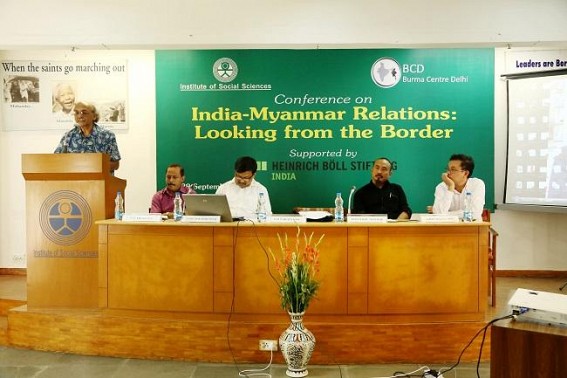Nava Thakuria

PHOTO : NE pie under Indo-Burma economic cooperation . Pic by Nava Thakuria
Burma (now known as Myanmar) may not transform into a complete democracy after 8 November’s General Election, but the development should bring positive result for the people of northeast India (NE). As
the neighboring country has started reconciliations efficiently with its different ethnic armed groups, the trouble-torn Indian region can anticipate lasting peace in the coming days.
An Indo-Burma conference, held on 28 & 29 September in New Delhi, ended with such positive notes for the Northeast. It was well accepted that a peaceful and progressive northern Burma would not be a
comfortable zone any more for the militants of northeast India, who are presently taking shelters in the jungles of Burma bordering China.
Various speakers, representing civil society groups, non-government organizations, media persons from both the countries of the conference titled ‘India-Myanmar Relations: Looking from the Border’ also emphasized on more people to people contact between the two neighboring countries more precisely the residents from Northeast and its adjacent Burmese localities.
Organized by the New Delhi based Institute of Social Sciences (ISS) and Burma Centre Delhi (BCD) with the support from the Heinrich Böll Stiftung India, the conference also witnessed many speakers batted for more Indian presence in the neighboring country albeit maintaining its credibility as the largest democracy of the globe.
The brainstorming conference also highlighted the pain of various communities of the region, which were divided by the Indo-Burma international border and urged the Union government in New Delhi to
provide adequate space for those communities to interact and share essential information as and when needed.
The speakers were unanimous in their views that the NE has to play an important role in India’s Act East Policy. However, it was cautioned that the sense of alienation of various communities in the region
should be addressed properly, such that they can also join in the process of development with the enhancement of India-Burma economic relationship.
In his key note address, former Indian Ambassador to Myanmar Rajiv K Bhatia argued that the newly launched Act East Policy is not a mere replacement of former Look East Policy. The policy switch focuses on action and implementation. If the earlier emphasis was on economic cooperation, now the accent is on strategic cooperation, added Bhatia.
Pointing out that Myanmar is going to play the role of a reliable window to India’s increasing trade & commerce with southeast Asian nations, Ambassador Bhatia, who has authored ‘India-Myanmar Relations:
Changing Contours’, also hoped that a liberal democratic Myanmar would emerge after the forthcoming general election.
Participating in the conference, another former Indian Ambassador to Myanmar Preet Mohan Singh Malik emphasized on efficient connectivity with the Myanmar. Expressing his concern over the increasing clout of China over Myanmar, Malik insisted on India’s extensive presence in the neighboring country. He argued that Myanmar remains a vital country for India on the security perspective.
Tapir Gao, former Parliament from Arunachal Pradesh, highlighted about the presence of northeast Indian militants inside Myanmar, lack of concrete border between the neighboring countries and the potential of India’s rail connectivity with southeast Asian nations including Myanmar.
Expressing hope that a new era in India-Myanmar relations would dawn very soon, the active politician also urged the civil society, media and other stakeholders to help providing a clear blueprint as to how the northeastern region can act as the game changer.
LianBawi Thang of Chin Human Rights Organization (CHRO) welcomed India’s engagement including in the Kaladan Multi-modal Project, but also called for accountability & transparency. He narrated that over 50 million people are living in India-Myanmar border areas who share their histories. He also expected New Delhi’s active move for the development of these people.
The speakers from NE highlighted the need of Myanmarese diplomat offices in Guwahati with regular flight services from Mandalay to Buddha Gaya via Imphal/ Guwahati to give a push to connectivity as also to promote Buddhist tourism. They also called for the earliest completion of the Integrated Check Post being built in Moreh which would house all regulatory agencies like immigration, customs, border security together with support facilities like warehouses, banks, quarantine office etc.
The NE participants including Dr Walter Fernandes, Prof Sanjoy Hazarika, Dr Ambuj Thakur, Nabachandra Singh, RK Shivachandra Singh, RajkumarBobichand, Dr BhabanandaTakhellambam, WitoubouNewmai, C Lalremruata, Sabya Dutta, Dr Biswajit Mohapatra, Dr Alana Golmei etc argued that northeastern people should stand to benefit the most from the connectivity corridors and civil society engagements.
The conference was also addressed by KhinMaung Win (Democratic Voice of Burma), Alec Blyth Scott (Kaladan Movement), Ting Oo (Arakan Rivers Network), Dr Shwe Hein (Chinland Development co. ltd), ZeyaThu, Myat Thu, RualLian Thang, RualLian Thang, Dr UdaiBhanu Singh, Rahul Bhonsle, CS Kuppuswamy, Ramya PS, Dr NamrataGoswami, Dr Ash Narain Roy, Dr Axel Harneit-Sievers etc.
[ Mr. Nava Thakuria is a Senior Journalist, Environment Journalist based in Guwahati, writes on various issues to Media across Asia, Secretary of JFA (Journalists’ Forum of Assam ) ]
To send your appreciation and comments pl. send email to editor@tripurainfoway.com or tripurainfoway@gmail.com or post online below.
- Why Modi’s BJP swept key India regional elections
- TIWN’s landmark legal victory against BJP Govt’s Illegal attacks to shutdown fearless Media
- India to be world's third-largest economy by 2030 -S&P Global Ratings
- Tripura's Dark Era : Mafia style Brutal attacks on Journalists, fight for your Citizen rights !
- How to access tripurainfoway.com via HOLA from India



